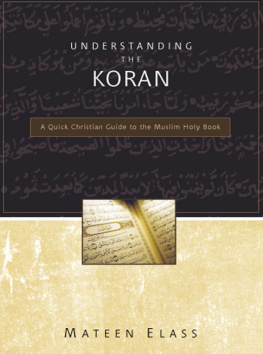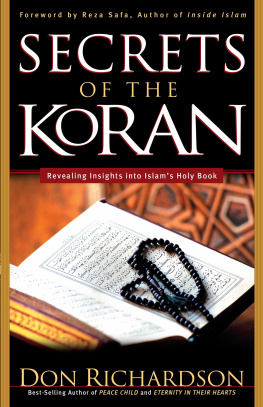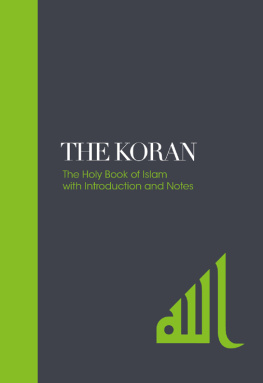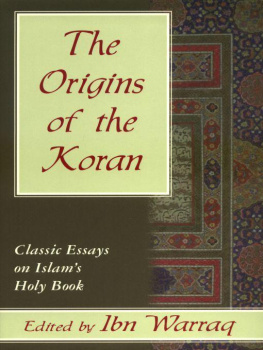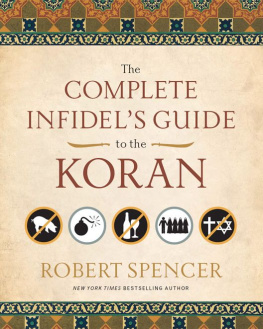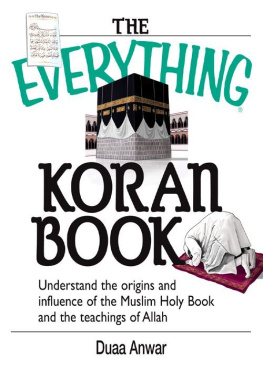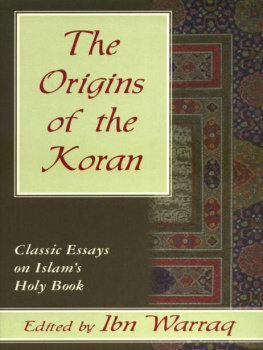ZONDERVAN
Understanding the Koran
Copyright 2004 by Mateen Elass
All rights reserved under International and Pan-American Copyright Conventions. By payment of the required fees, you have been granted the non-exclusive, non-transferable right to access and read the text of this ebook on screen. No part of this text may be reproduced, transmitted, downloaded, decompiled, reverse engineered, or stored in or introduced into any information storage and retrieval system, in any form or by any means, whether electronic or mechanical, now known or hereinafter invented, without the express written permission of Zondervan.
ePub Edition JULY 2009 ISBN: 978-0-310-29860-1
Requests for information should be addressed to:
Zondervan, Grand Rapids, Michigan 49530
Library of Congress Cataloging-in-Publication Data
Elass, Mateen, 1955
Understanding the Koran : a quick Christian guide to the Muslim holy book / Mateen Elass.
p. cm.
Includes indexes.
ISBN-10: 0-310-24812-4
ISBN-13: 978-0-310-24812-5
1. Koran-Relation to the Bible. 2. IslamRelationsChristianity. 3. Christianity and other religionsIslam. 4. KoranCriticism, interpretation, etc. 5.KoranControversial literature. I. Title.
BP134.B4E43 2004
297.1226102423dc22
2004002229
CIP
All Scripture quotations, unless otherwise indicated, are taken from the Holy Bible: New International Version. NIV. Copyright 1973, 1978, 1984 by International Bible Society. Used by permission of Zondervan. All rights reserved.
The website addresses recommended throughout this book are offered as a resource to you. These websites are not intended in any way to be or imply an endorsement on the part of Zondervan, nor do we vouch for their content for the life of this book.
Interior design by Lori Vezina
05 06 07 08 09 10 /v DC/ 10 9 8 7 6 5 4 3
CHAPTER
1
The Koran through Muslim Eyes
T wice a day, the cannon shot echoed across our town. It was Ramadan, the ninth month of the Islamic calendar. My family lived in Saudi Arabia, and the artillery booms marked the officially determined times of dawn and sunset, between which all practicing Muslims were to fast from food, drink, and other pleasures.
Saudi Arabia is a self-described Muslim nation and, as such, promulgates and enforces the teachings of the Islamic prophet Muhammad as found in the Koran. Fasting during the month of Ramadan is one of many of these practices. Since it is commanded in the Koran, it is enjoined on all faithful Muslims. Why? Because for the Muslim the Koran is the Word of God, the highest authority on earth by which to regulate ones life. It is their Holy Book, and it plays a role in Islam in many ways similar to that of the Bible in Christianity. Yet there are also many significant differences, and the task of this book is to help those unfamiliar with the Koran to become conversant enough with it and its place in Islamic society to compare and contrast it with the Bible and its use in Christian contexts. I also hope that by the time you finish reading this book, you will have increased confidence in conversing about faith issues with Muslims you may encounter in daily life or travels.
A Growing Number of Muslims
Islam claims over 1.2 billion adherents worldwide, second in size and scope only to Christianity, which numbers roughly 1.9 billion. Together, these two religions account for almost half the worlds population. Amazingly, they remain relatively ignorant of each others central beliefs. Though the reasons for this are no doubt complex, they should not continue, at least not for the Western Christian world. For many years, Islam has seemed to the Christian West to be a religion of the Middle East and other Third World nations. Having little direct contact with Muslims, most Christians remain ignorant of this world religion. But because of the influx of Muslim immigrants to Europe and North America, the rise of militant Islam and its attendant terrorist targeting of Western interests, and the reopening of painful wounds in the Israeli-Palestinian conflict, Islam is very much in the forefront of media interest. Issues of style of dress, special dietary rules, different days of worship, and stringent religious practices are all contributing to a new curiosity among Americans as to the nature and beliefs of Islam.
Christians can no longer afford to be indifferent to the teachings and practices of this faith birthed in the seventh-century Arabian Peninsula, which now finds its home in the bulk of Asia and Africa and is quickly making inroads into Europe and the United States. If the church is to be serious about its commission to make disciples of all people groups, then we must be conversant with the belief system that presently sways one fifth of the worlds population. Perhaps the quickest way to do this well is to familiarize ourselves with the Koran, which stands at the heart of Muslim theology and practice.
A Unique Physical Book
For the Muslim, there is no book on earth that is its equal. Roughly the size of the New Testament, it claims to be the revelation of Allah (God) to Muhammad in the language of Arabic. Native Arabic speakers recognize a beauty and power in the poetic diction of the Koran, which some claim has never been equaled in the history of human communication. For this reason, as well as because of the theological place of the Koran in the Arab Muslim world, Koranic Arabic has become the standard for what is now known as classical Arabic, the primary dialect of the educated and refined throughout the Middle East.
Since Muslims consider the Koran to be the literal words of God (i.e., spoken directly from the mouth of God through the angel Gabriel to Muhammad, who then repeated these exact words to his listeners, who in turn memorized or transcribed them), the physical book itself becomes an object of holy veneration. There are particular rules for how it is to be handled and treated. For example, in elementary schools in Saudi Arabia, children are taught to wash themselves and be in a state of ritual purity before handling the Koran, to kiss it three times before opening it to read, and then to kiss it again three times and touch it to ones forehead after closing it and putting it away. Menstruating women must not touch it. The Koran is not to be left open and unattended, lest the devil or a jinn come along and read it (presumably, their unclean

presence would greatly dishonor it, and their increased knowledge of Allahs Word would enable them to cause more mischief).
As a sign of its ultimate value, the Koran is to occupy the highest place in a home or mosque, above all other books or objects. Hence it should be on the highest bookshelf in the house, with nothing sitting above it. When held, it is never to be carried below the waistline. When transported among belongings in a suitcase, it is to be the last thing packed so as not to be covered by anything else. It is never to be placed on the ground, lest one incur the wrath of Allah. Often, however, the Koran is read by those seated on the floor prior to prayer. For such individuals there are special book holders that allow the book to rest open and off the ground. It is a great dishonor and embarrassment to allow the Koran to fall to the earth.
I remember a story, perhaps apocryphal, that circulated throughout the Middle East in the early 1970s about one of the earliest African-American athletes to convert to Islam. Desiring to learn more of the faith he had embraced, he accepted an invitation to tour the holy sites of Islam in Saudi Arabia. His presence caused a great stir of excitement among Arab Muslims in Mecca and Medina. Dressed in Saudi robes and carrying a Koran, he cut quite a figure among the admirers surrounding him. Asked for his autograph, he found a chair on which to sit, and then very naturally tucked his Koran under the chair legs so as to be out of the way while he signed papers. Immediately, the bustle around him ceased with stunned and embarrassed silence. When one of his handlers recognized what had happened, he quickly retrieved the Koran, brushed it off and kissed it, and apologized profusely to his fellow Muslims on behalf of the athlete, who after all hadnt known any better.

